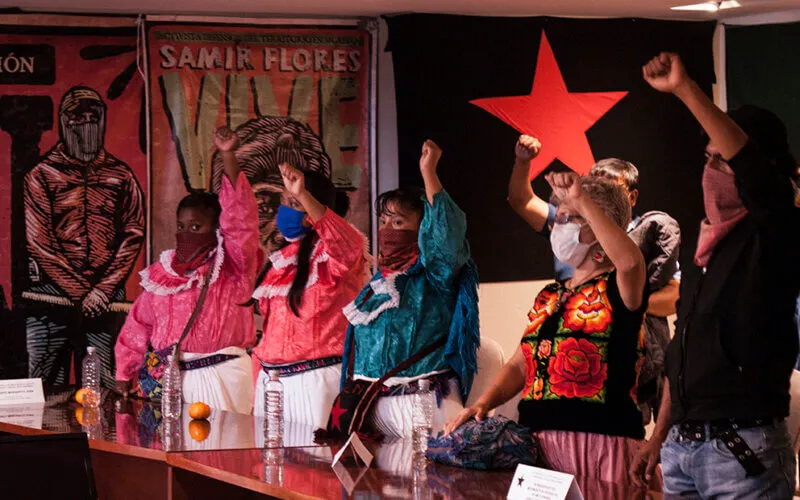“We indigenous women are fighting, and we recognize ourselves as being violated by this patriarchal system, but we also have a voice and we are also organizing ourselves.”
In our everyday lives, in any geography, we see the work that women do to provide for their families, manage their homes, care for their parents, participate in their children’s education, and contribute to the safety and health of their communities. In Chiapas, and all across Mexico, indigenous women (Zapatista and women of the National Indigenous Congress) fulfill these same functions three-fold, while also struggling to defend their lands and communities from the violence that rains down from above.
These women experience a triple oppression of being women, indigenous and poor. And now they are also persecuted for being defenders of territory. Now more than ever, indigenous territories throughout Mexico face dispossession by the impositions of capital, and militaristic and patriarchal violence by both State and non-State actors.
Despite the manifold struggles that confront them, in their daily activities, these women in resistance build and strengthen the autonomies of their communities, in education, health, economic production and governance. Their vision shapes what is meant by self-government; the continuity of indigenous communities as peoples, and the construction of an equitable society, and the defense of life on our planet.

For all of these reasons, we have made a commitment to support the organizing processes of indigenous women in resistance: for the autonomy that they build in organizing collectives, health workshops, and community education; for the spaces they create to protect themselves and one another; for their diverse, yet unified voices in defense of their territories and cultures, and for the strength that they bring to that struggle for life which belongs to ALL OF US.
A brief history of the organizing of the women of the CNI
The CNI (National Indigenous Congress) was formed in 1996 as a space for meeting, reflection and solidarity of the original peoples with the objective of strengthening the struggles of resistance and rebellion with their own forms of organization and decision-making.
In 2018, the women of the CNI were invited by the Zapatista compañeras to the International Meeting of Women in Struggle March 8-10 to listen to each other and learn about the experience of the diversity of struggles that exist within the women’s movement. “In that moment it [March 8th] became a day of struggle for all women, regardless of whether or not they are feminists, to make visible our demands for our freedom, our security, and for life. It is precisely these words that we take up again from our Zapatista compañeras, the commitment to stay and to keep one another alive.”
It was after that first Encuentro in March of 2018 that the women of the CNI gathered to give continuity to the agreement they established then to “keep on living and fighting,” and a second time the following year, at the Second International Meeting of Women in Struggle which was also held in the Zapatista caracol of Morelia, with the participation of more than 4,000 women from 49 countries. The third meeting took place last year in Mexico City.
The CNI women, at their own pace, took the opportunity to work intently on the issue of violence experienced by indigenous women. Following Marichuy’s appointment as spokesperson of the Indigenous Council of Government (CIJ) they held their first meeting to strengthen the voices of women and identify the patriarchy that exists in the communities.
Some of those voices
“Right now, the indigenous territories of Mexico face a struggle against projects of extermination that seek to extract the natural resources that we have preserved and which are now coveted by transnationals and large corporations that want to exploit our minerals, our water, our forest…. and finally dispossess us of our territories, something that is not experienced in the same way in the cities.”
“Although we are diverse within the CNI (different peoples, different languages, worldviews, way of eating) we identify with each other through a series of sufferings and ways of responding to these pains and aggressions that we have experienced as indigenous peoples. And that makes us very different from the mestizo peoples and the logic of the city.”
These are the voices that are multiplied and elevated when women can come together to share their experiences and their strategies for dignified struggle.
Friends, we are moved to be able to support the 4th National Meeting of the Women of the CNI-CIG this coming weekend, August 5 – 6th as indigenous women from around Mexico convene to coordinate their respective and collective resistances. And we hope that you, compañeras, compañeros and compañeroas, will also be moved also to continue YOUR support.
Thank you for all that you do!
